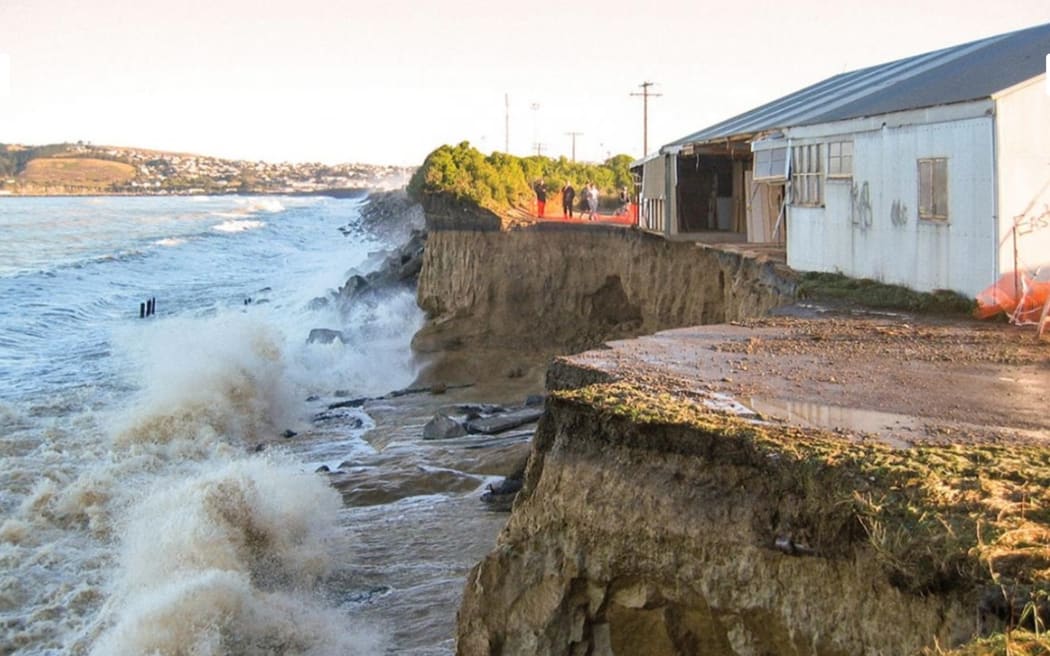
In June 2007, the coastal cliffs at Oamaru were washed away, affecting this factory and a conservation area for blue penguins Photo: NIWA / Murray Hicks
One of the biggest issues facing New Zealand is the cost of climate change, and our poor preparedness as a society to foot the bill for climate-induced hazards on the coast such as sea level rise and increasing storm surges. Much of our infrastructure and many communities are located in coastal areas. We need creative thinking about how we respond to a changing climate, because who will pay when we are forced to go?
Highlights from this panel discussion recorded in association with the University of Otago:
Guyon Espiner:
Let's start with the magnitude of this problem. What are we facing right now in 2019?
Janet Stephenson:
An incrementally worsening scenario for our climate that is going to be evident in a number of different ways: one is a gradually increasing sea level. Another is increasing storm events so that the wave action on your coast is going to get stronger and more powerful. Also an increase in the number of cyclones coming to New Zealand delivering frequent, really heavy rain. And for coastal areas, it is when those risks combine that you're going to get really serious impacts. And we're already seeing the effects in many places.
Guyon Espiner:
And where are those places, Ben?
Ben France-Hudson:
I think across the country, there are examples such as South Dunedin, which is a fairly densely-populated area, which has had some terrible flooding over the last few years. In the news recently has been a small community called Matata in the Bay of Plenty, which suffered from a fairly devastating landslip early in the 2000s. People rebuilt there, on the understanding that an engineering solution would prevent the problem from happening again. Turns out there isn't an engineering solution. And there is a great risk of loss of life for that community. The most recent development was that the local district council and the Department of Internal Affairs have agreed a package of about $15 million for voluntary buyouts. And I guess the question is that if that doesn't work, what do you do with the people who refuse to take the buyout?
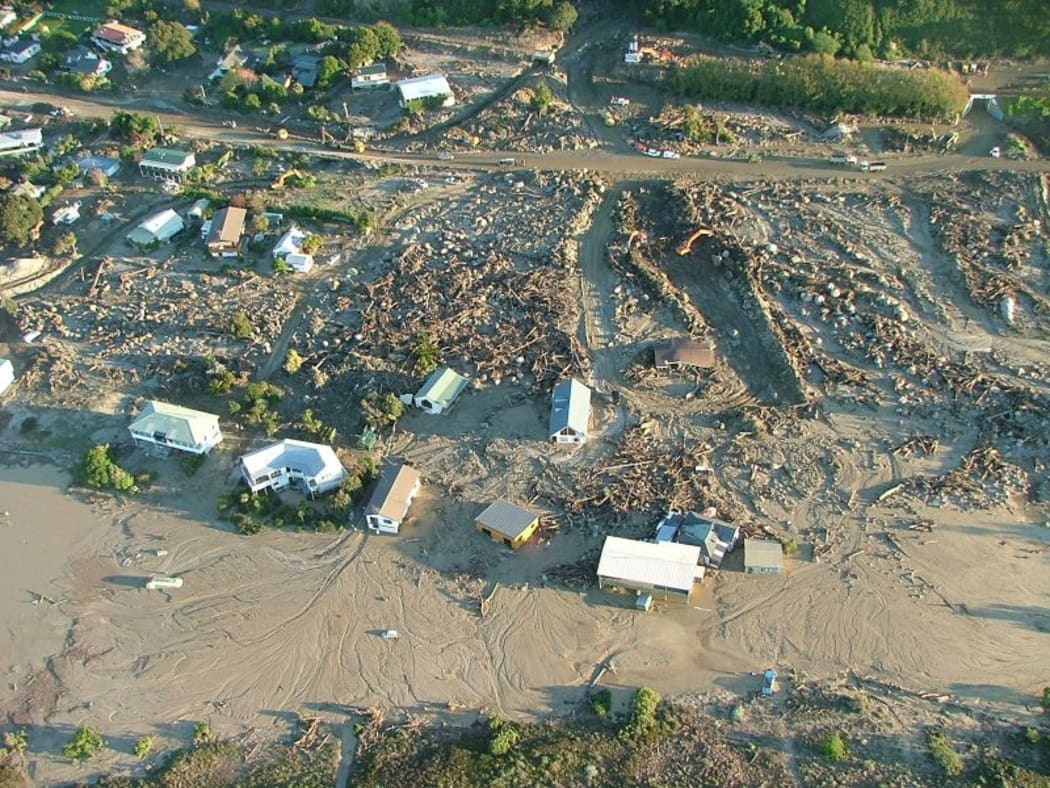
In May 2005, torrential rain washed boulders, logs and debris down a flooded stream, badly damaging properties in Matata . Photo: GNS
Lisa Ellis:
We have this enormous problem in Matata with only a few dozen properties. We're talking tens of thousands of properties in the medium-term that are at risk from the combined effects of climate change over the next century. And we need to get our minds around the scope, it's going to affect absolutely everyone.
Caroline Orchiston:
And that's the thing. We're an island nation, and we love living by our coast, I think 65% of our population and infrastructure lies within five kilometres of the coast.
Guyon Espiner:
There was a Ministry of Environment report saying 130,000 New Zealanders and about 43,000 houses are at risk of sea level rise. That gives you some idea of the scale of the problem, I guess you're looking at when this is actually going to happen. But from what you're saying this is happening right now?
Caroline Orchiston:
That's right. I mean, the impacts will be differential across different communities. Think of Granity, it's been in the media lately, just a small place on the west coast, that's being eroded away by the changing sea. South Dunedin is one of the greater urban areas at risk, but there are many examples right around the coast of our communities at risk.
Guyon Espiner:
And what are we doing about it? What are the responses from? Well, let's start with local government, because that's where it probably hits first, isn't it?
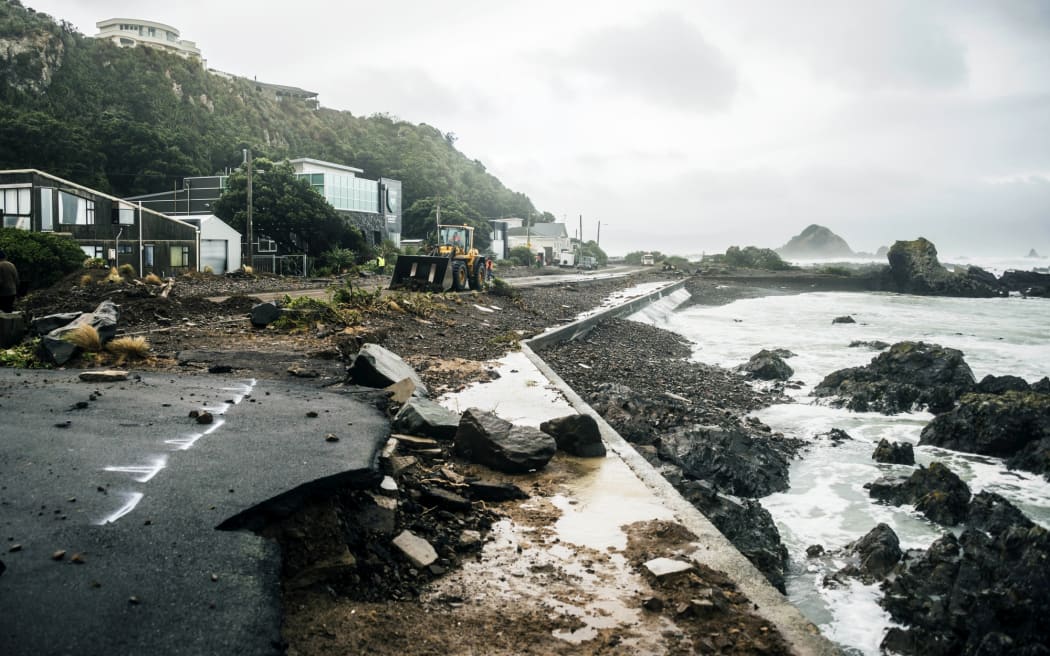
Storm damage along the Esplanade, Owhiro Bay, Wellington, 2013. Photo: NIWA / Dave Allen
Janet Stephenson:
I'm speaking here from a survey that we have recently carried out with, with local authorities in the more exposed areas of New Zealand. And by exposed I mean, likely to be faced by flooding and sea level rise in the years to come. And what has emerged from that is a really high level of nervousness from councils. Because there is a great deal of uncertainty about first of all the law who is responsible for what there's a great deal of uncertainty about what those impacts might be and what it might cost councils in the long term to start to deal with that even just from an infrastructure perspective.
So roads, sewage systems, boat, ramps, recreational areas are all under threat. And also, there's a great deal of nervousness about how do you even start to talk to your communities about this problem. Because it's, it's incredibly emotional to be told that your property may well be under threat in the coming decades, because we have a certain sense connection to place. And once that starts becoming shaken, as we know from the Christchurch earthquake, it can really destabilize people. So it's a huge issue for local authorities for those and many other reasons.
Guyon Espiner:
So what is the template that they using? You mentioned Matata, how does the process work?
Ben France-Hudson:
I think it's pretty clear that we don't have good legal frameworks for dealing with the challenges that are coming. So from a land use planning perspective, the primary tool is the Resource Management Act, which was not designed with these kinds of problems in contemplation. New Zealand has historically had a focus on managing hazards, as opposed to managing risk. We're on the back foot, though risk-based planning is becoming more mainstream. But then you've got broader questions around who should make the decision. When the decision is made? How does it get paid for? And at the moment, I don't think we have good answers to any of those questions.
Guyon Espiner:
And as Janet was intimating, people don't always want to leave. You can understand that even in the Christchurch earthquake red zone. The evidence was there in front of their eyes, but they did not want to leave. So what do you do? Can you force people to leave in those situations?
Ben France-Hudson:
Technically, yes. The Crown can acquire people's property compulsorily. We see that reasonably often with things like the Public Works Act, but it tends to be a last resort. There isn't a bespoke piece of legislation at the moment which would fit in this context. There's a question about whether or not you can do it under the resource management act, which is something I've been looking at recently. And the answer is "Possibly," where the risk is fairly high, and fairly immediate. But it might be very difficult because what you are talking about is telling people that they can't live in their property any more.
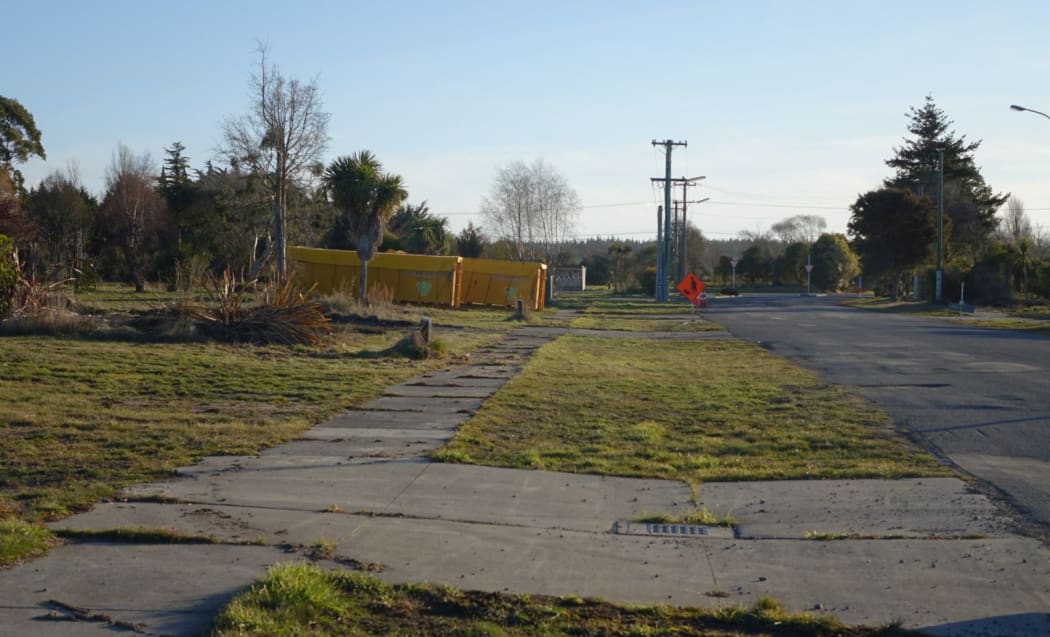
Red zone: The bumpy roads of Brooklands lead to empty cul de sacs and vacant land plots. Photo: RNZ / Georgina Stylianou
Lisa Ellis:
It's much better for people to make these decisions for themselves. Recently in Hawke's Bay, they had a community-level decision making exercise, where people spent about a year going to meetings and talking to engineers and making decisions about what sorts of solutions they would apply. when things got worse. When people get together and make collective decisions about what they want to see in their community then it's much less frightening than the prospect of somebody telling you that you have to leave your property because of a threat. It's something that we all need to think about doing more of.
Janet Stephenson:
But I think, in Hawke's Bay, the question wasn't really do people leave or not? It was "Do we invest in sea walls?" Is that right?
Lisa Ellis:
Well, it should have been, they should have addressed a broader range of solutions. So people said at the end of that process, we put managed retreat into the too-hard box. And that's not surprising, given the fact that it was the first big such exercise, and that people were primed to think about it from a personal property perspective. But in fact, it's certainly something that communities ought to be considering. Because people have value that's shared with the community. It's not simply a matter of private property. One of the reasons that we're so place-based, is that we have social capital with each other. And it would be far better for people to decide to preserve their social capital together than to be isolated and frightened.
Guyon Espiner:
People are also going to be thinking about their economic capital as well, though, aren't they? And under those circumstances that we're talking about, they wouldn't be able to sell a home. What happens in those circumstances?
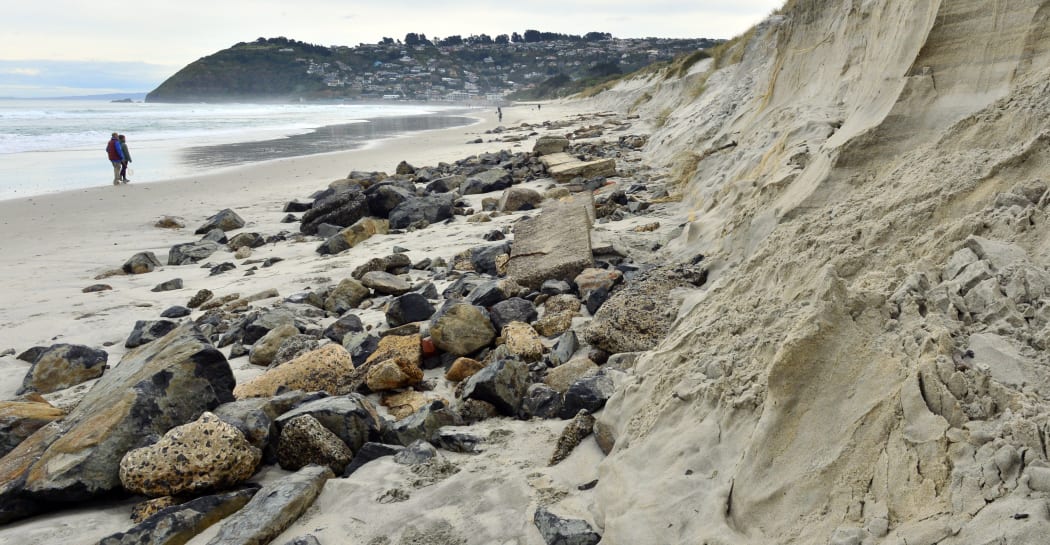
Erosion at Middle Beach looking back toward St Clair from the end of Moana Rua. Photo: Photo / Otago Daily Times
Caroline Orchiston:
Right now, there's a lot of fear from the councils. Often we react when acute events happen. And in South Dunedin, that's exactly what happened. The mayor was outspoken about the prospect of managed retreat. At that time, the community is hugely vulnerable. It's not when you should be having that conversation. It should have been happening before that.
Janet Stephenson:
But it's not only homes, is it? Its infrastructure. What do you do with with roads and other key infrastructure that potentially could be underwater?
Caroline Orchiston:
Exactly. We have a huge network of roads, water, critical infrastructure around our coast, and councils are grappling with how to they might have to relocate some of that over time, and it's a costly exercise, I think that the figure was something like $32 billion to deal with some of those issues at the coast.
Ben France-Hudson:
To that we could add their obligations, because one of the outcomes of the red zone in Christchurch and the people who chose to stay there, was that the court said that the council had an obligation to continue supplying them with at least water. And if you've got a water pipe that's got to go that far, you may as well have everything else. So the the costs could be huge.
Lisa Ellis:
There's an equity issue also that comes with that because you wouldn't want your capacity to deal with climate change to depend how well-resourced your particular local council is.
Guyon Espiner:
When we think about coastal properties often we think about the higher-income people who've got properties. But that's not always the case, is it?
Lisa Ellis:
No, it certainly isn't. In fact, there are plenty of vulnerable people living in the coast or in low lying areas. There are a lot of people pursuing agriculture in low lying areas who are going to be affected by sea level rise and groundwater intrusion and all of the other things that come along with climate change. We have to worry that we're, if we don't adjust our regulatory framework, we're going to be transferring risk to the most vulnerable
Guyon Espiner:
Is there a degree of complacency? I mean, we're still subdividing this land. We're still selling it, I was speaking to someone who said his father had bought a holiday home that he could only drive to in low tide.
Lisa Ellis:
I wouldn't blame the father. You can't expect people to behave according to rules that we haven't made yet. And he doesn't know what the risks are. If we could send a clear signal that you can no longer expect to have risky coastal development supported and compensated, then people would be able to make better decisions.
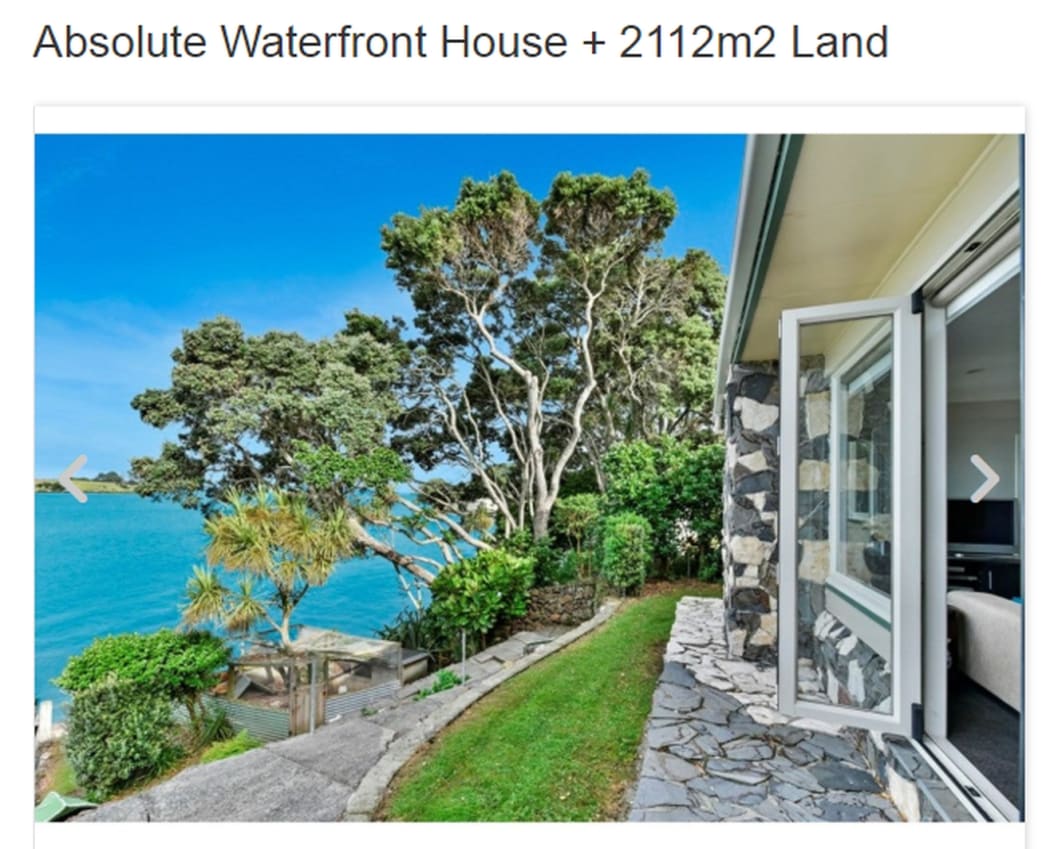
Property by the sea is popular on TradeMe Photo: TradeMe
Guyon Espiner:
Aren't we going to have to pretty urgently set some of these rules in place, because you can't just be selling, developing and allowing people to buy if your modelling shows that this is going to be underwater. I mean, that's setting people up for disaster, is it not?
Ben France-Hudson:
I couldn't agree with you more. And the logic then goes, "Well, you said that I could live there. And I live there and I've suffered loss, therefore you owe me." And so regardless of what local government responsibility is, there's risk that some clever lawyer is going to say, "Well, this is like the leaky home crisis. You said my windows were fine. And they weren't. So pay me some money, please." And the logic to my mind is exactly the same: "You said I could live here. And actually, you were wrong. Therefore, you owe me."
Janet Stephenson:
The danger there is that once some crafty lawyer and his very wealthy client have got a decision through the court, that sets a precedent. That then puts everybody else into a situation where there are unfair outcomes of this collectively.
Caroline Orchiston:
And that's happening with the red zone in Christchurch.
Ben France-Hudson:
New Zealand has got a history of bailing people out when things go wrong, whether it was the Napier earthquake, or our accident compensation scheme, EQC, all of these trends, and you look at the red zone, and Christchurch. And although Matata is an extreme example, again, it looks like the solution there is to pay money.
Lisa Ellis:
But when you think of the scope, that's just not going to be equitable, or even practical. I think we have some examples from overseas that show that you can overcome those legacies of expectation. In UK villages that have been devastated by coastal erosion, there's been a lot of centrally provided compensation. But they looked at their risk in the context of climate change, and started drawing lines. And now if you've built new property after a certain date, you cannot expect to be even be insurable, much less be compensated. It's possible there, it's possible here.
Ben France-Hudson:
And then you really need the people in charge to stick with it.
Janet Stephenson:
That's a brave move. Yeah.
Guyon Espiner:
Why is it not on the LIM report, for example? I mean, if I'm buying a property, one of the first and basic things that you would do is look at the risks of this property?
Lisa Ellis:
It's a transfer of risk to the most vulnerable not to put the hazard on the LIM. We need to have a uniform rule, so that you don't suffer disproportionate disadvantage depending on where you live.
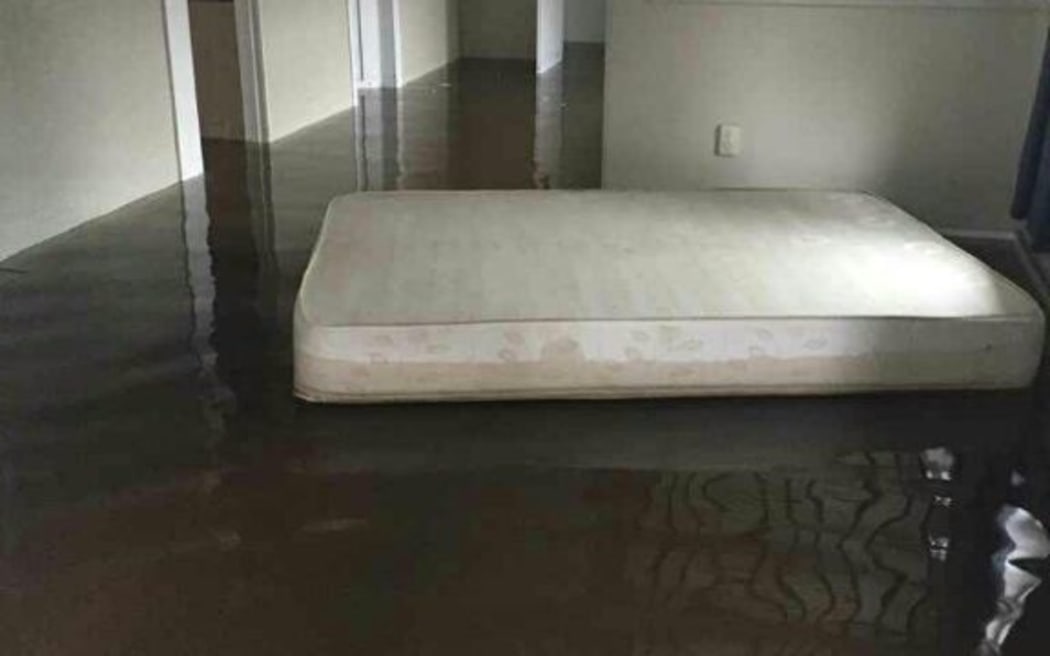
A floating mattress in a flood-stricken home in Kapiti. Photo: RNZ / Katie Scotcher
Ben France-Hudson:
And there's no legal impediment. It's all political impediments. The one case on it, the council won. In the Kapiti Coast, lines had been drawn on LIMs for properties along the coast. And the owners objected and went to the High Court, and the High Court said, "Yes, you can draw a line, but don't draw such a big dark black one. Come up with a different way of representing that [information] that's less scary. And then the council went away, and decided not to pursue that policy. But there was nothing to stop them from putting those lines on the map had it been drawn in a sufficiently careful way.
Caroline Orchiston:
And of course, people do get very serious sensitive about a loss of value of their assets. In Wellington, for example, the council made the decision to draw blue lines across areas where where people needed to get beyond in order to be safe from tsunamis: the blue line project. And when that was proposed, people living in those suburbs were deeply concerned because it would affect their property prices. But in reality, when those lines went in, after short-term sort, and then people began to live with them, and there was no effect on property.
Lisa Ellis:
And everybody's better off because you have less uncertainty.
Guyon Espiner:
Let's talk about insurance. Usually insurance is the company taking a bet on whether something will happen or not, and how much risk they're prepared to bear. But this is not like that, is it? Because for most of us, it's a certainty.
Lisa Ellis:
Everybody has this touching belief that we've behaved rightly, over the years, we've always paid our insurance premiums, we've maintained our property, so we ought to be covered. But we need to remember that insurance contracts are twelve months long.
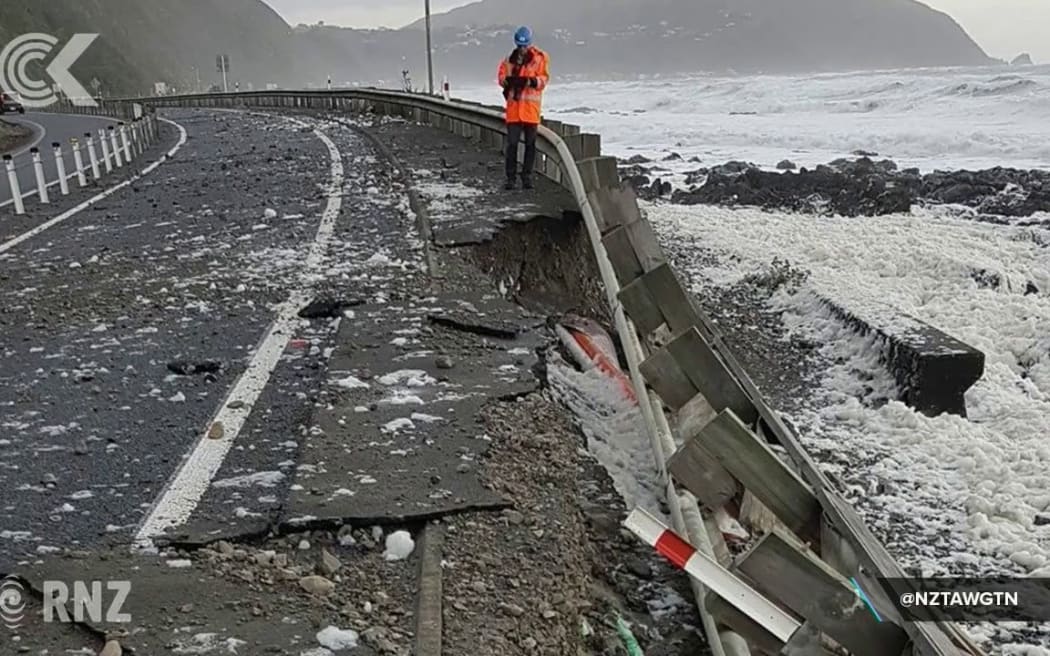
Part of Kapiti Coast sea wall collapsed due to storm damage Photo: RNZ / YouTube
Guyon Espiner:
If I'm an insurance company, right, why would I ensure a property knowing for certain that the science is saying there's a 90% chance that this property is going to be underwater in 50 years?
Janet Stephenson:
That's exactly right. The insurance Council has already made it clear that in cases where climate impacts are certain and sure, they have no issue with rising costs and eventually if it gets too bed, they will pull insurance. And as your bank will require you to be insured, if your insurance is pulled, then your bank is probably going to renege as well.
Lisa Ellis:
The reinsurance market funds our insurance company companies and spreads the risk across the globe, insuring lots of different countries with different levels of risk. So although New Zealand is a high-risk country, it's a small fish in a big pond, in terms of insurance payouts. And so I think insurers have a moral obligation to remain them in the market for as long as they possibly can.
Guyon Espiner:
"Moral obligation" and "insurance companies. "What could possibly go wrong? [Laughter from the audience] I don't want to be too cynical about this. But are they going to fulfil that?
Caroline Orchiston:
The conversation we've just had, is pointing to a sort of a chaos situation where no one is able to get insurance. What happens beyond that?
Guyon Espiner:
Well, I don't know. Is it going be muggins the taxpayer who picks up the bill again?
Lisa Ellis:
The insurers negotiate with local governments to try to reduce risk. So for example, in Flockton Basin, the insurers were active working with local government to try to make it safer, and more insurable. And I think one thing that New Zealand ought to be thinking about is that if we are a larger group of us, not just a neighbourhood or a small part of a city, but if everybody is negotiating with insurance about collectively reducing risk in order to reduce the loss of insurability, then we're much more likely to get a good deal. If they can pick us off neighbourhood by neighbourhood, we're not going to be in a position of advantage.
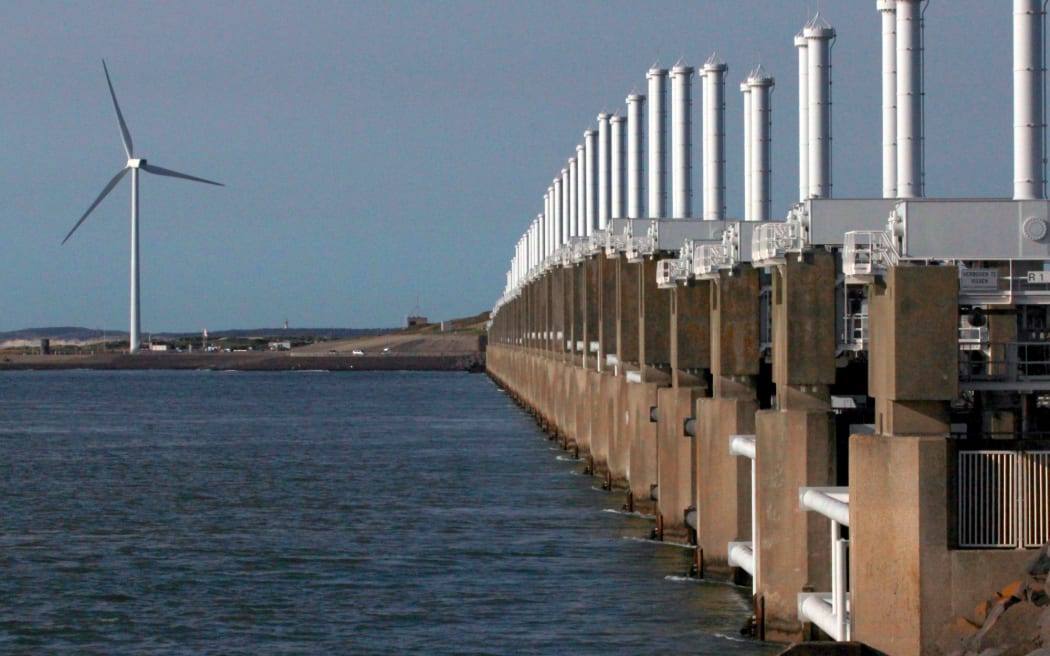
Oosterschelde storm surge barrier in the Netherlands Photo: Flickr / Mark Fletcher
Guyon Espiner:
Can I ask a naive question? Why can't we just build sea walls? Look at the Netherlands.
Lisa Ellis:
The Netherlands coast is fairly small in extent. We have one of the longest coastlines for any country in the world, I think -
Ben France-Hudson:
- the ninth longest -
Caroline Orchiston:
- so we couldn't possibly afford to build a wall long enough to protect it.
Ben France-Hudson:
The other thing I think you need to think about is that Kaikoura gets all the sharks and whales, because a kilometer off the coast, or 100 metres off the coast is the continental shelf. So it's not the North Sea.
Lisa Ellis:
The Thames barrier blocks something that's not very deep. It's not possible to have something like the Thames barrier in Wellington harbour. Sea walls also don't make the sea's energy dissipate, but instead they move it to everywhere that doesn't have a sea wall. And why did you move there? You moved there because you enjoy the beach which you will lose if you build the sea wall. So in the long run, sea walls are a really a last-ditch measure, temporary frighteningly expensive.

The Thames Barrier in closed position Photo: Flickr / Loco Steve
Guyon Espiner:
So is retreat the only option?
Lisa Ellis:
Certainly not, there are all sorts of different solutions. You can rebuild wetlands. You can talk about how you build your houses, where there are a number of different things we can do. For example, you can raise the floors of new-build. Or it's possible to have houses that float: you build four rods on your box-shaped house, and you have your house can float up and down. You can have a house with a basement that's attuned to flooding. In the Rhine delta, a lot of people have their electricals only on the first floor, and everything on the ground floor is moveable. There are many ways to adjust to this threat that do not include managed retreat, but are not as as temporary, expensive, and collectively irrational as sea walls.
Caroline Orchiston:
There are councils already changing building code so that new builds do have to be elevated to a certain level. And that's happening in Dunedin now.
Ben France-Hudson:
My slight caution, is that you're not necessarily mitigating the risk, if the hazard is increasing. A lot of people think that they are holding the line by not allowing the risk to get worse by having raised floors, and all of that kind of thing. But at some point, if all of those measures are insufficient, the risk may in some circumstances, require leaving.
Guyon Espiner:
What are the treaty implications of this? I mean, wahi tapu sites? Marae on the East Coast, for example, vast tracts of Maori land that could be affected by this?
Ben France-Hudson:
I think those obligations could be profound. One small example is that the Crown under the principles of the treaty has a duty of active protection. So what does that mean? It could mean that the crown needs to be working with those communities now to be planning for what happens. And it could be that the when the land, for argument's sake, can't be occupied anymore, those people are found equivalently important land somewhere else. And it could also be that if the Crown is not thinking about these things the Waitangi tribunal may in fact say that [to act in this way] was a breach of the Treaty.
Janet Stephenson:
And iwi are already thinking very hard about this and if the place that is yours and has been yours for for many, many generations is now disappearing into the sea and becoming washed away then and the bones are your ancestors are being affected then that is hugely emotionally devastating.
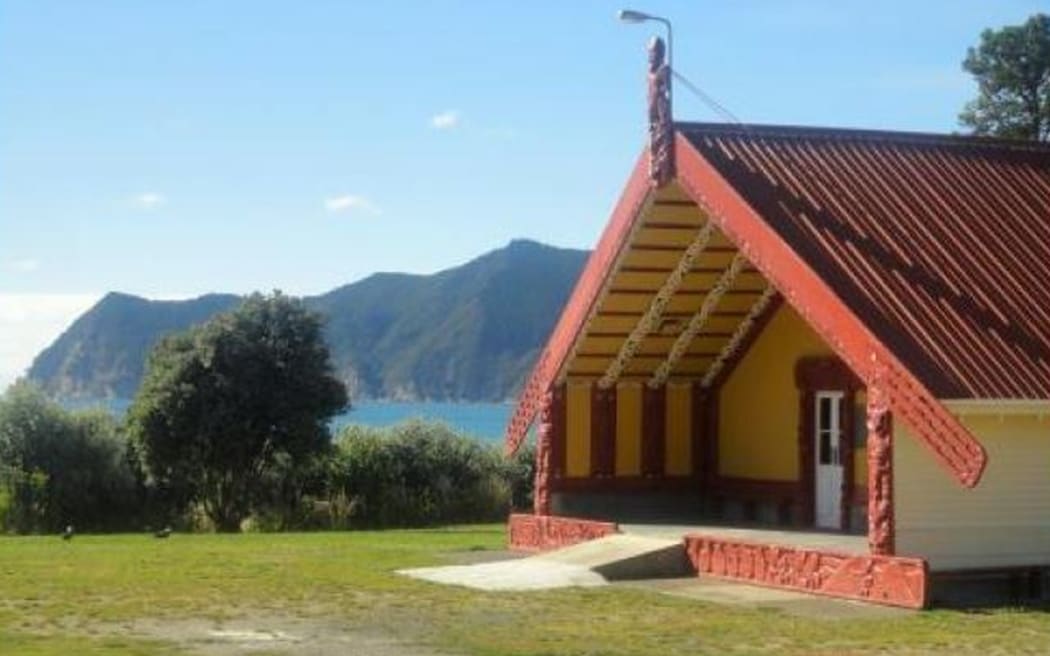
Iritekura Marae on the East Coast Photo: Ngati Porou
Ben France-Hudson:
Some of the best-resourced iwi like Ngai Tahu have a climate change adaptation strategy. And they're being very proactive and almost opportunistic about the possibilities being presented by climate change. They are, for example, land banking in areas where they think the climate is going to change to make agriculture of certain kinds much more possible. They're currently looking at moving marae from the coast, and in doing so building, the runanga's ability to look after the ahi kaa, the people that are keeping the home fires burning in those marae.
Caroline Orchiston:
Which government's going to be brave enough to try and develop a whole new raft of legislation dealing with these climate-related issues?
Lisa Ellis:
It does need to happen from central government because the scope is so large. In a single case, it doesn't seem devastating. But the effect of mass compensation, according to market value, dollar for dollar would be that ordinary people working two or three jobs would end up compensating people for their second beach houses. It's not an outcome most people would call equitable. Therefore it calls for a national-level decision about how we're going to trade off.
Guyon Espiner:
Let's have a look at some of the things that we do now in analogous situations. Like the EQC: we have a big fund. The ACC too. Because we know we have work accidents, what do we do? - set up a big firm that invests in equities that tries to make enough money to pay out when those things happen. Are we heading towards a situation where we need a climate change sovereign wealth fund that can pay out in future?
Lisa Ellis:
I'm really glad you mentioned that, because we haven't yet mentioned intergenerational justice. It's obviously unfair to transfer the whole risk of climate change to the future, and to leave our children, grandchildren and great-grandchildren with an enormous burden that we did nothing to mitigate. So I do think we're obliged to think about spreading this risk not only across the country, but across generations.
Guyon Espiner:
The productivity commission recently said that helping councils adapt to climate change was at the top of its list of urgent actions.
Lisa Ellis:
But in the same report, they said it's possible that we could just allow people to assume all of the risk associated with their property, which is a terrifying and ridiculous question.
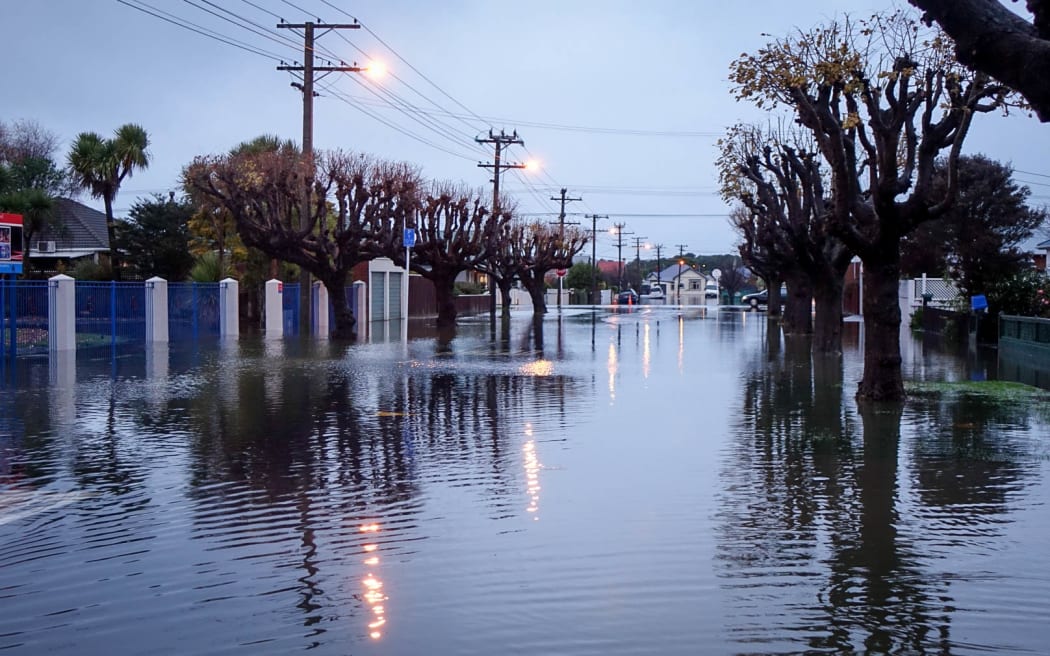
Surrey Street, South Dunedin. Photo: RNZ / Ian Telfer
Janet Stephenson:
We tend to focus on property, but actually, a lot of people in areas like South Dunedin, for example, don't actually own property. They rent there. But with incremental impacts from climate change, and lowering property prices, and maybe higher insurance costs, one of the fears I have is that landlords are much less likely to be investing in those properties and keeping them up. And so what we will get is a gradual development of ghettoization.
Guyon Espiner:
In South Dunedin, some of those communities must thinking about whether it is sustainable to live there longterm.
Janet Stephenson:
There are there are many places in New Zealand that are being impacted in a whole variety of ways from from climate. I would be very loath to say that South Dunedin is the worst affected.
Guyon Espiner:
Oh sure, they're not alone. Hutt City Council reported that large parts of Petone could be underwater by the turn of the century. This is real stuff for people who are buying houses in the future for our children and grandchildren, isn't it? So what are councils doing about it?
Lisa Ellis:
We need to make sure that we're not making these decisions simply based on market value. It would be a terrible mistake for us to say, in places like South Dunedin we need to talk about managed retreat; but in wealthy cities with a big concentration of value, we're going to talk about hard engineering solutions. People who aren't property owners have real, measurable social cultural value that the community [should] seek to protect.
Janet Stephenson:
And also say that coasts are actually part of all of our identities. We go there, as children, we catch fish there, we play on the beach, we take our boats out on the water, we camped there, we have huge memories about the places that we enjoyed. For your children and grandchildren, that could be really different. Part of what concerns me about these issues is actually an erosion of what it is to be a kiwi because our coast could look really different in 50 years' time. So it's not just a financial issue. It doesn't just affect the people who live in and own properties in those places now. It affects every one of us as New Zealanders.
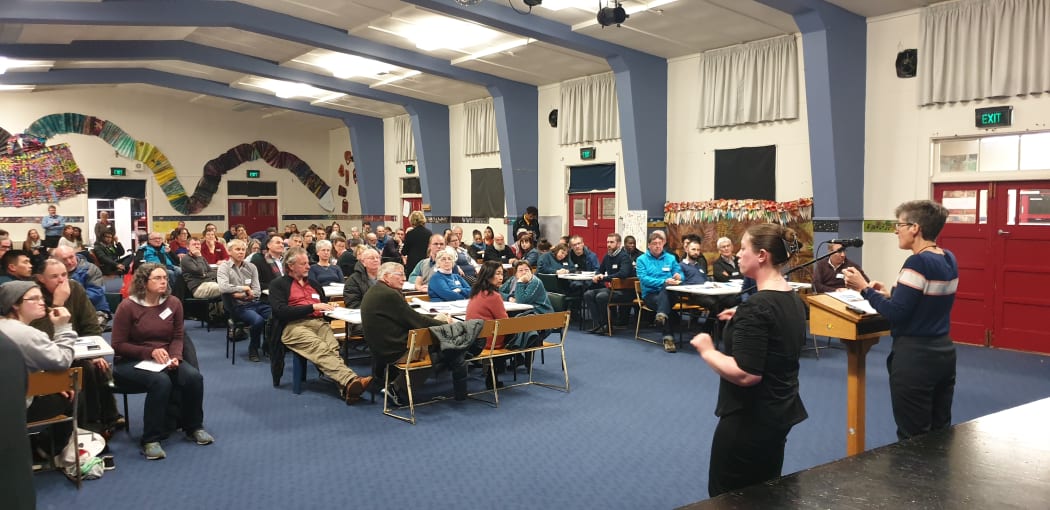
South Dunedin residents met with scientists, engineers and policy makers to discuss water issues hitting their low-lying suburb. Photo: Tess Brunton
Guyon Espiner:
I'm going to open this up for questions very shortly. But I did want to finish with some hints of optimism. What are the things that we can do?
Caroline Orchiston:
I see so many positives in the work that we've been doing recently with strong communities who are seeking to coalesce around climate adaptation, but also to build resiliency. And it might be that they would like to build their identity through festivals, or food or energy, you know, transforming [themselves].
Lisa Ellis:
We need to think too about the opportunity cost of not doing anything. Our current dependence on auto-mobility, something that everybody in Auckland understands. isolates us from each other, and makes it more difficult for communities to have a say in outcomes that affect them. It would be wonderful for us to undertake these changes and also get stronger ties to each other, less isolation from each other.
Ben France-Hudson:
The law in New Zealand's extremely flexible so there's no impediment to coming up with good legal frameworks to do whatever we want them to do.
Guyon Espiner:
Time now for audience questions at this Otago University symposium about how we are responding to the effects of climate change on our coastline.

Youth climate activist Greta Thunberg Photo: AFP
Questioner
This may sound a bit silly, but I was wondering, what can normal people do to stop climate change?
Lisa Ellis:
There is so much to do, both personally and collectively, I think the most important thing that everyone can do is talk to their neighbours and their friends about it. Don't be isolated. And don't despair.
Caroline Orchiston
One thing is thinking about our emissions. If we're flying somewhere, we're releasing carbon into the atmosphere. And that's bad for climate change. So we need to consider the way we travel and if we really you need to go places. Can we do stuff, actually, by not traveling?
Janet Stephenson:
Two or three things are really important. One of them is actually to eat a whole lot less meat. Because eating less meat is the single biggest impact you can have in your personal life, unless you are a big flyer. If you fly internationally to Perth or to the UK, you're blowing your greenhouse gas emissions out of the water, it's three or four times your household's emissions for a year. So that's two big things. And I see a number of gray heads around this room here. You've probably got investments. Think about where your money's invested. Can you talk to your superannuation scheme and say, ?I want to divest from fossil fuels and invest in positive alternatives." So there's three things.
Ben France-Hudson:
My suggestion would be to dream. I think humans are amazingly inventive. And I think that there may be solutions out there that haven't even been taught. So to someone of your age outside just dream big.
Caroline Orchiston:
Be the next Greta Thunberg.
More about the speakers

Assoc. Prof Janet Stephenson, Prof. Lisa Ellis, Dr Caroline Orchiston, Dr Ben France-Hudson. Photo: University of Otago
Associate Professor Janet Stephenson
Janet is a social scientist with an interest in societal change and in the connections between people and place. She currently leads the Climate-Adaptive Communities project in the Deep South National Science Challenge researching how communities and councils are responding to the threat of flooding and sea level rise, with a particular focus on engagement and new ways of self-organising.
She has been Director of the Centre for Sustainability since February 2011. Her academic background is in sociology, planning and human geography.
Dr Ben France-Hudson
Ben is a legal scholar, with a background in legal practice. His expertise includes private property theory, land law and natural resource/resource management law. He has always been particularly interested in the interface of these different areas, which is acute in the context of climate change. His most recent project has considered the issue of extinguishing existing uses of land in the context of risk reduction. His current teaching includes Property Law and the law of Vendor and Purchaser.
He is also an associate member of the Property Law Section of the New Zealand Law Society and in 2018 was appointed to its Property Law Reform Panel.
Dr Caroline Orchiston
Caroline is a Research Fellow and Deputy Director of Otago University’s Centre for Sustainability. She joined the Centre in March 2016. Her research focusses on building a more resilient New Zealand by transforming how we prepare for and mitigate against rapid (earthquakes and floods) and slow onset (climate change-related) disasters.
Caroline is contributing to two projects relating to rural and cultural resilience in the Challenge programme.
Professor Lisa Ellis
Elisabeth (Lisa) Ellis teaches ethics, environmental philosophy, and philosophy, politics, and economics and is from the Department of Politics at Otago. She is the author of Kant’s Politics: Provisional Theory for an Uncertain World (2005) and Provisional Politics: Kantian Arguments in Policy Context (2008). She is a political theorist interested in collective action and democratic decision-making.
When thinking about the societal risks of climate adaptation, Lisa uses simple game theory and critical description methodology to analyse how our institutions mediate our moral relations to one another.
This session was recorded by RNZ in association with the University of Otago

Photo: 123rf

